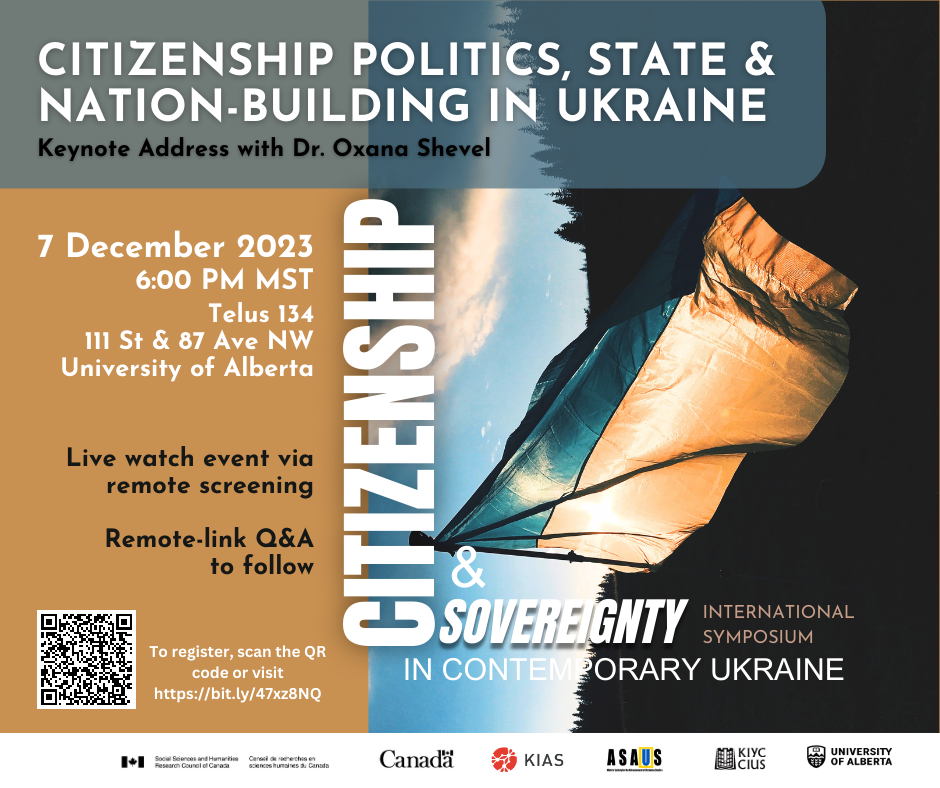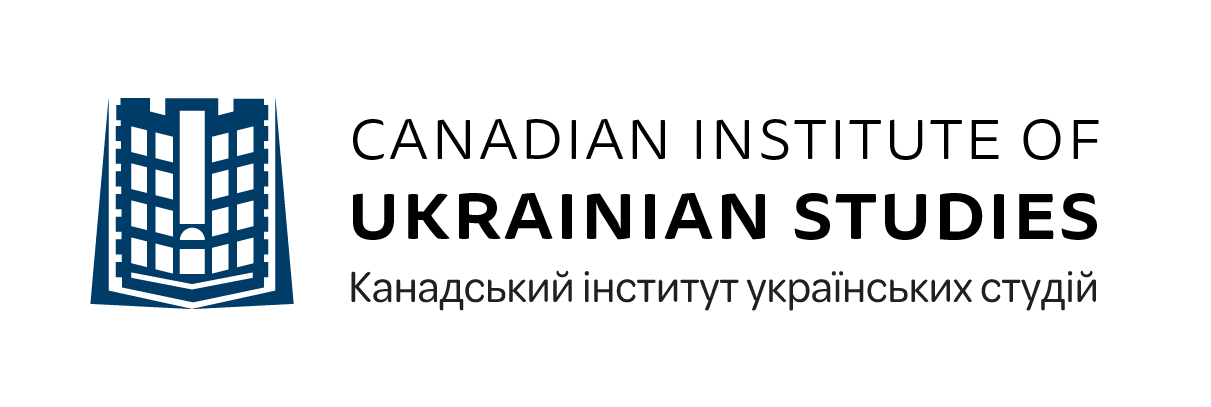International Symposium - Citizenship & Sovereignty in Contemporary Ukraine
Citizenship and Sovereignty in Contemporary Ukraine International Symposium
7-8 December, 2023
University of Alberta (Edmonton, Canada)
Aims and objectives
This two-day symposium is a public event and seeks to share knowledge on sovereignty and citizenship studies with respect to Ukraine, consolidate emerging and established scholars working in the area, launch a transnational and inter-generational academic network, and solidify the field of interdisciplinary citizenship studies at the University of Alberta and beyond. The event aims to explore the newest sociocultural history of Ukraine from the seminal but rarely employed theoretical perspective of citizenship studies by pursuing the following objectives:
- to explore discourses, practices, policies, and imaginaries of sovereignty and citizenship, including affects, economies, ideologies, spatialities, subjectivities, and temporalities relevant to contending articulations and experiences of citizenship in Ukraine;
- to connect Ukrainian studies scholarship with transnational critical citizenship studies, with particular focus on analytics of neoliberal governmentality, Indigenous critiques of state-centred sovereignty, and post-/decolonial perspective on Eastern Europe;
- to recalibrate scholarly understandings of sovereignty and citizenship, keeping in focus not only legal, regulatory aspects but also diverse performative practices of 'doing citizenship' and ‘becoming’ political subjects by people and communities, so to develop new methodological and theoretical directions for further inquiry; and
- to build new networks of international, scholarly, and cross-disciplinary collaborations and partnerships in the area of critical citizenship studies of and around Ukraine.
The ultimate goal of the symposium is to create a space to collectively generate and share new forms of knowledge in an intellectually stimulating environment with ample opportunities for exchange.
Conceptual framework and theoretical focus
This symposium sets out to explore the discourses and practices of citizenship in Ukraine, including the affects, economies, ideologies, spatialities, subjectivities, and temporalities relevant to contending articulations and experiences of citizenship. While citizenship as an analytic concept emerged in such disciplines as political science, philosophy, and law, today, it has been increasingly employed in anthropology, sociology, psychology, and other disciplinary domains and across them.
The symposium aims to challenge the classic interpretation of citizenship as membership of the nation-state (Marshall 1950) from several critical perspectives. Firstly, we seek to problematize the prevailing way of situating the construction of citizenship and its origins in a Western context. In this respect, we are particularly interested in building a dialogue with decolonial thinking and Indigenous critiques of state-centred sovereignty and citizenship.
Secondly, we would like to explore performative aspects of citizenship that have refocused citizenship to be seen not as a mere membership but rather a performative political process of ‘becoming’ political subjects that allows keeping in focus not only legal, regulatory aspects but also diverse practices of 'doing citizenship.’ Considering citizenship as an everyday practice that is played out in the ‘ordinary’ contexts of everyday life, we also seek to rethink sovereignty not just “as a set of political capacities but as formation in society that engages with ways of life” (Humphrey 2007, 421). Simultaneously, a legal perspective on citizenship remains of great importance to the symposium since a formal legal status draws crucial dividing lines between different categories of the population. In the case of Ukraine, the focus is kept on both non-citizens inside Ukraine and Ukrainian labour migrants elsewhere.
Event Highlight: Keynote Address

Citizenship Politics, State and Nation-Building in Ukraine with Dr. Oxana Shevel
7 December, 2023; 6:00 p.m. MST
TELUS 134 (111 St & 87 Ave NW, Edmonton)
This talk will discuss the importance of citizenship policy making as a tool of state and nation-building in new states that emerge suddenly from collapse of multinational empires. In the context of new statehood where national and state border are often not congruent, citizenship policy making and specific citizenship rules can serve to strengthen (or weaken) national identity and sovereign statehood. The talk will address these dynamics on the example of Ukraine where since the late 1980s citizenship rules—especially dual citizenship—generated both domestic debates and tensions in relations with Russia. As Ukraine resisted Russia's persistent attempts to utilize citizenship as a tool to foster political integration, the politics of citizenship policy in Ukraine and in Ukraine-Russia bilateral relations offer insights into broader causes of Russia's current war against Ukraine.
Oxana Shevel is an Associate Professor of Political Science at Tufts University and director of the Tufts International Relations Program. Her research and teaching focus on the post-Soviet region, especially Ukraine and Russia, and topics such as nation-building, identity, citizenship and memory politics, church-state relations, and democratization processes. She is co-author (with Maria Popova) of a book on the root causes of the Russia-Ukraine war, Russia and Ukraine: Entangled Histories, Diverging States (Polity, 2023). Her earlier book Migration, Refugee Policy, and State Building in Postcommunist Europe (Cambridge, 2011) won the American Association of Ukrainian Studies (AAUS) prize for best book in the fields of Ukrainian history, politics, language, literature and culture. Prof. Shevel serves as Vice President of the Association for the Study of Nationalities (ASN) and of the AAUS. She is also a country expert on Ukraine for the EU Global Citizenship Observatory, a member of the PONARS Eurasia scholarly network, a board member of the Shevchenko Scientific Society, and an associate of both the Davis Center and the Harvard Ukrainian Research Institute. Prof. Shevel holds a PhD in Government from Harvard, an MPhil in International Relations from the University of Cambridge, and a B.A. in English and French from Kyiv State University.




